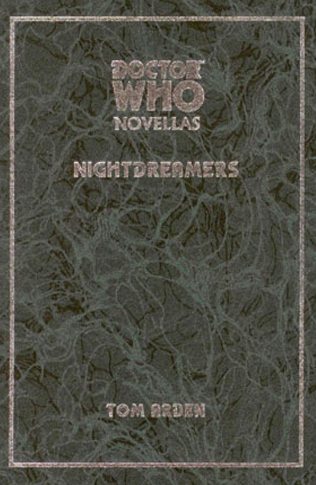
Tom Arden – Nightdreamers
Telos, 2002, 112pp, £25, 1-903889-07-3
Deep in a forest, a group of mismatched lower class artisans rehearse a play in which one of them must take the part of a wall. Elsewhere we find a young woman forcibly betrothed to one man though she loves another, and her beloved hexed by an impish little fellow into falling in love with someone else. One of the actors has a head like a monster. And it’s Perihelion Night.
Tom Arden takes on A Midsummer Night’s Dream and wins. Rather than slavishly follow the Bard’s plot he mixes and matches, reworking it into an early 70s Third Doctor/Jo Grant era Who adventure. We start with only three cross-matched lovers; Jo herself rounds up the quartet, still pining after Latep, the Thal with bad 70s hair that she didn’t follow back to Skaro. The lovers are all given far more character than Shakespeare ever managed — you can actually tell them apart. We recognise some of the roles — Puck, the Rude Mechanicals — and some of the scenes, but there is no sinking feeling of “there’s the guy with the funny head, now it must be time for the wrong man to get the love drug.” Instead the streamlined version of the play is mixed in with other Shakespearean elements (the Duke owes more to Prospero than Theseus) and an enjoyably Whoish plot of rival planets and politics, a castle that’s really a spaceship, black-leather-clad bad guys, and a closing scene straight out of the well-hardest sf you’re likely to find.
It’s not just a fun story but it’s told with obvious love and affection for the Who era in which it is set. The story takes place on Verd, a small, forested moon. The setting is small even by the story’s own frame of reference and Arden uses only a few scenes, so it’s no difficulty at all for your mind’s eye to set the whole thing within your old black and white TV that took 30 seconds to warm up, on a dark Saturday evening back in 1973. You can even picture the BBC sets.
The gravity on Verd is highly variable, meaning that characters are likely to find themselves bouncing or even flying at any moment. The short novella length of the story means that the plot rattles along, barely giving the reader or the characters time for breath; there is an over-arching logic to the whole thing but you never notice. It just makes sense at the time. Puck’s valedictory “If we shadows have offended …” rhyme has never been more appropriate: it really is like a dream.
£25 is steep for a novella hardback, but a “standard” version is also available at £10.
